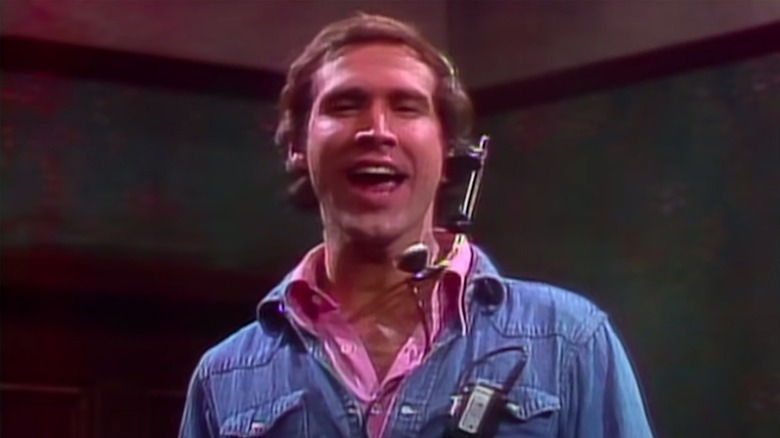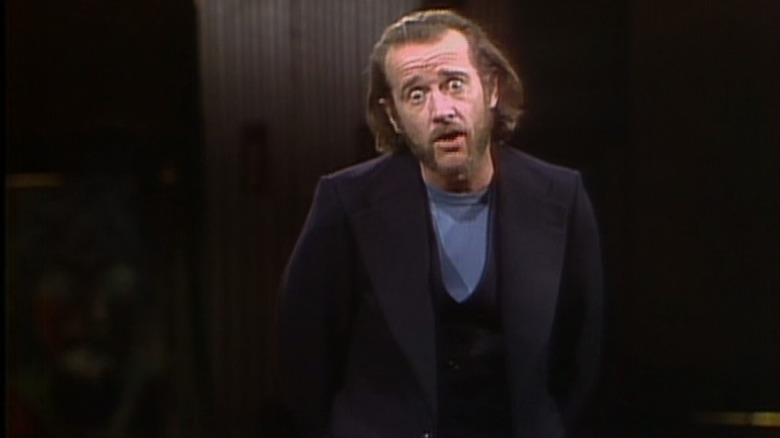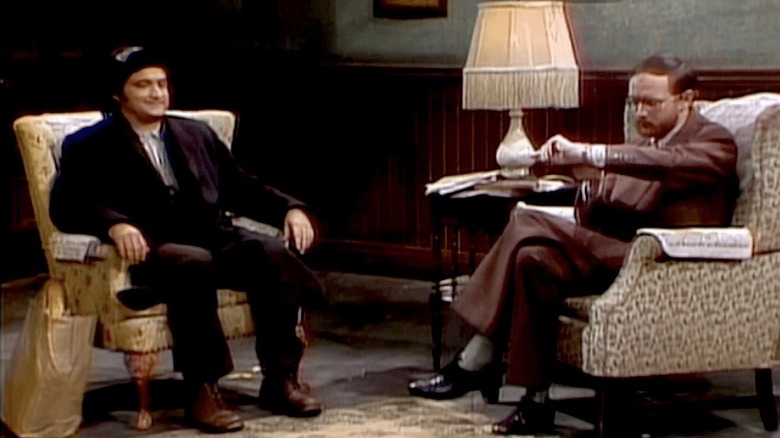What Happened During Saturday Night Live's First Episode (And How Critics Reacted)
Unless you've been on an arctic expedition during all of 2025 or in a coma (in which case, welcome back!), you are no doubt aware that "Saturday Night Live" has celebrated its 50th anniversary. As part of the celebration, the comedy institution produced a series of documentaries, held a massive homecoming concert at Radio City Music Hall (which, per Adam Sandler, was paid for entirely by Kevin Nealon), and aired a live primetime special on NBC.
That this momentous event occasioned a spate of critical writing from just about every outlet worth its weight in clicks was hardly surprising. "SNL" has been a reliable generator of takes from tepid to scorching since it premiered on October 11, 1975. It has been accused of being too political or not political enough, too liberal or too conservative, and, worst of all, unfunny. At several junctures, critics have called for it to be cancelled (and it very nearly was after the disastrous season 11), while there have been stretches of time where it felt absolutely essential — most notably during the late 1980s and early 1990s, when the most talented cast in the show's history teamed with head writer Jim Downey to boldly satirize the stupid state of the world.
"SNL" endures, and now that the show's latest episodes can be experienced via sketch highlights on streaming services like YouTube, it will likely remain on the air at least until creator Lorne Michaels finds the soil. Though there's a sense nowadays that the show hit the ground running 50 years ago with a cast stacked with future superstars, the show confounded some of the country's most influential critics. Some were quick to dismiss it. One prominent reviewer panned what was initially titled "Saturday Night" after barely watching the first two episodes. How did the show survive its early growing pains?
Why did some critics pan SNL?
Before the cable, let alone streaming age, it was rare for a network television series to take a wild, format-challenging swing. On one hand, "Saturday Night Live" wasn't doing anything terribly new; it was a variety show that combined comedy sketches with music performances. But the ballsy cold open, which featured Michael O'Donoghue teaching English to a foreign gentleman played by John Belushi (via the nonsensical prompt "I want to feed your fingers to the wolverines"), was not the kind of comedy you expected from "The Dean Martin Show" or even counterculture friendly series like "The Smothers Brothers Comedy Hour" and "Rowan & Martin's Laugh-In." This was different.
The New York Times' television critic, John J. O'Connor, held off writing about the buzzy new series until after its second episode aired. Though he only watched the second half of that second episode due to being waylaid by "an unusually good dinner on Long Island" (if I acknowledged that I skipped half of a movie in a review, I would expect to be fired and deemed unemployable going forward), O'Connor wrote "Even an offbeat showcase needs quality, an ingredient conspicuously absent from the dreadfully uneven comedy efforts of the new series." As for the first episode, which he apparently viewed in full, he found George Carlin's brilliant monologues to be "pretentious comedy lectures" (i.e., too liberal for his go-along-to-get-along East Coast establishment blood). Carlin did his "Baseball-Football" routine, for cryin' out loud. If you don't find that funny and/or perceptive, your opinion is frankly worthless.
If you've read one of the compelling histories of "SNL" or, at the very least, watched Jason Reitman's dress-up pageant "Saturday Night," you know the contents of that first episode. If not, it should be noted that, while the sketches were short, the premiere was much more representative of what the show would become than the second episode — which was basically a Simon & Garfunkel showcase. Just about everyone outside of O'Connor found the debut intriguing at the very least. The only other significant critic to fire torpedoes into the hull of this just-launched vessel was The Hollywood Reporter's Richard Hack, who wrote that the first episode "was plagued throughout with a lack of exciting guests and innovative writing, helping to keep the debut at a lackluster pace."
Why did some critics immediately embrace SNL?
Most television critics took a wait-and-see approach with "Saturday Night." New York Magazine's Jeff Greenfield wasn't a fan of the Albert Brooks shorts (which, while hilarious, clashed with the show's more aggressive sense of humor), and, like most people, found Jim Henson's Muppets to be showstoppers in the very worst sense. But in gaining access to the talent involved in that first episode, Greenfield observed, "The promise of 'Saturday Night' is enormous.
Time found "Saturday Night" to be "uneven," but found tremendous value in its standards-flouting humor. Dick Adler of the Los Angeles Times concurred, but nevertheless lobbied for the series to be aired in a late primetime slot. The New Yorker and Chicago Tribune were also keen on the show, but TV Guide went a step further by declaring the series funnier than "Monty Python's Flying Circus." "Taste in humor is perilous territory," wrote the magazine's Cleveland Amory. "There are those who may take offense at the man [Garrett Morris] who presents the news for the hard of hearing — he screams the headlines — but to us, at least, it's very funny when he hollers."
After the end of the series' first season, Rolling Stone's Tom Burke raved over the show's format-breaking daringness. He wrote that it was a "head show, one to get high before, during and on, as high as its actors clearly are." The show's drug-friendly appeal occasionally brought out the self-destructive worst in its stars (most notably Chris Farley and John Belushi), but that danger was integral to its success. "Saturday Night" needed a season to find its footing, but that essential edginess was there from day one. And television critics who couldn't be bothered to leave a dinner party in Long Island to do their freaking job only made it seem cooler.


